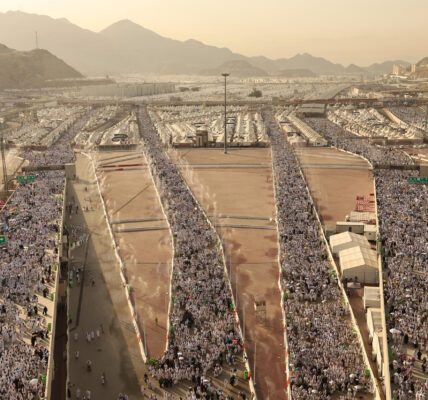The Egyptian authorities suddenly released more than 450 political detainees a few days ago, in a move that raised questions about its causes and implications.
Lawyers and activists said that most of those released had previously been arrested during the events of September 20, 2019, in which the actor and contractor Mohamed Ali called to demand the departure of Abdel Fattah al-Sisi in what became the largest demonstrations calling for the president’s departure since his arrival.
Others have been released in 19 various cases since 2014, including demonstrations against the al-Sisi regime’s ceding of the strategic islands of Tiran and Sanafir in favour of Saudi Arabia.
According to international human rights organisations, these demonstrations are rare in Egypt in recent years, as the authorities have placed impeccable restrictions on demonstrations, and a crackdown has been launched against all opposition groups. According to observers, the authorities are working on releasing larger numbers of political detainees and batches of criminals during the coming period.
However, these releases will not include any famous political figures, which happened with the academic Hazem Hosni when he was detained under a new case. Perhaps this case is the best evidence that these evictions were not a breakthrough in the public sphere or a gesture by the authority to demonstrate the improvement of human rights conditions and reduce the number of detainees.
Reducing numbers
The first of these reasons is the Ministry of the Interior’s desire to reduce the numbers in prisons to avoid overcrowding, amid widespread fears of a fierce second wave of the corona pandemic, which may lead to an increase in the number of infected inside prisons. It is noteworthy that the past months have witnessed the arrest of thousands against the background of the popular movement demonstrations in rural areas, which raised the number of detainees in prisons, thus accumulating cells. This overcrowding in prisons, and the inability of the authorities to administer them to fully implement the medical protocol that was put in place for measures of social distancing, and to reduce the numbers inside cells and wards, led to the detention of nearly half of the detainees of the recent popular movement in police stations.
This prompted the Ministry of Interior to expedite the release of more than 2,000 prisoners, taking advantage of the presidential pardon by a conditional release on the occasion of the anniversary of the October victory, and then the release of this large group of political detainees, to allow the opportunity to transfer the new detainees to the central prisons. This year, Egyptian prisons witnessed difficult conditions in light of the corona pandemic due to ill-treatment, medical negligence, and an increase in deaths. Visits were banned for about five months, and a new mechanism was put in place based on the pre-registration of those who wanted to visit, which allowed for a prolonged ban on most detainees in cases of a political nature, and those accused of joining organisations and groups opposed to the regime.
Western contacts
According to sources who talked to Egypt Watch, some European embassies have made communications with the Egyptian Ministry of Foreign Affairs, criticising the escalation of human rights violations in the country, including the conditions of detainees. According to the sources, these embassies expressed their concern because the follow-up of the events made clear the clarity of the regime’s attempt not to recognise the broad popular demonstrations and the recent mass movement and its attempt to portray it as factional demonstrations. During those contacts, embassies also expressed concern about the increase in the number of detainees connected with the events, whether during their participation in demonstrations or as part of security campaigns to intimidate and limit the expansion of the popular movement.
These contacts also strongly criticised the continued imprisonment of dozens of political and human rights activists, who were arrested before and after the events of September 2019. The sources stated that some of the contacts that took place were coordinated between several capitals to affirm their collective interest in Egypt’s human rights situation. He indicated that there are discussions in various European capitals, such as Berlin and Rome, to review the level of security dealing with Egyptian agencies and coordination in the areas of training, grants, financial and logistical assistance, as one of the issues in which European capitals must act differently compared to military cooperation and investment.
Joe Biden
The third main reason is the increased chances of US Democratic presidential candidate Joe Biden to win the position. According to indicators and experts in international relations, al-Sisi does not favour a change in the White House, which may create problems and criticisms of his administration in files related to democracy and human rights.
Biden had previously criticised the conditions of detainees in Egypt and condemned the death of the American citizen of Egyptian origin, Moustafa Qassem, in his Egyptian prison at the beginning of this year. He has also previously criticised the administration of Republican President Donald Trump for failing to deal with this issue and with the human rights situation in Egypt. In a famous tweet last July, he returned to launch a double attack on Trump and al-Sisi, holding the former responsible for Muhammad Amasha’s detention in Egyptian prisons for 468 days. He also threatened to deal differently with al-Sisi if he won the presidency, saying: “No more blank cheques for Trump’s favourite dictator.”
What reinforces the Egyptian state of concern about Biden’s victory is the demand from congress members, and before them deputies in the European Parliament, through separate letters they addressed to al-Sisi, to respect human rights and to release political detainees immediately. The crackdown on freedom of expression during the reign of al-Sisi reached its worst level in the country’s modern history with unprecedented intensity, according to the description of Amnesty International.
Since the summer of 2013, Egypt has witnessed a political crisis that continues since the military coup against the late President Mohamed Morsi, and the subsequent detention of tens of thousands of his supporters, against the background of charges denied by the opposition related to terrorism and the attempt to overthrow the regime. The arrest of political activists and civil society forces in Egypt raises European and American criticism, while Cairo says it is committed to implementing the law and supporting freedoms.





Recent Comments